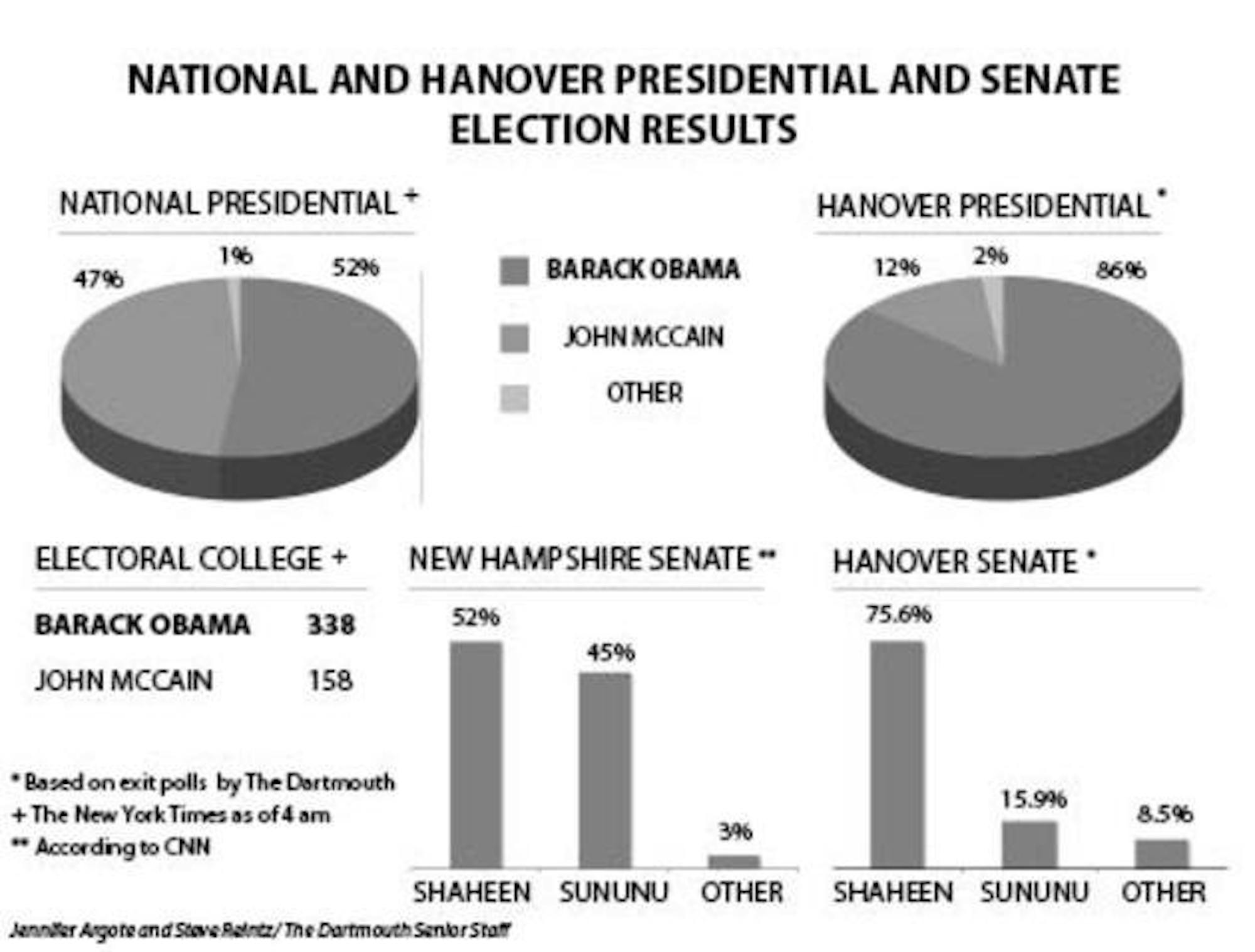"This victory alone is not the change we seek, it is only the chance for us to make that change, and that cannot happen if we go back to the way things were," Obama said in a speech to tens of thousands of supporters in Chicago's Grant Park Tuesday night. "It can't happen without you, without a new spirit of service, a new spirit of sacrifice"
By early Wednesday morning Obama had secured 338 electoral votes and 52 percent of the popular vote, a resounding victory over McCain's 163 electoral votes and 47 percent of the popular vote. Obama triumphed in crucial swing states McCain had hoped to win, like Ohio and Florida, two states that were critical to President George W. Bush's wins in 2000 and 2004.
Obama won New Hampshire with 55 percent of the vote, with 84 percent of precincts reporting, according to CNN. In Hanover, Obama received 86.2 percent of the vote, according to exit polls conducted by The Dartmouth at Hanover High School.
The Dartmouth's poll indicated the most important issue for local voters was the economy, with 31 percent of respondents listing it as their top concern in the election. Other issues of concern for local voters included foreign policy, the war in Iraq and health care.
In his victory speech, Obama, acknowledged the historic importance of his election, using 106-year-old Georgia voter Ann Nixon Cooper to highlight the nation's trajectory of change.
"She was born just a generation past slavery -- a time when there were no cars on the road or planes in the sky. When someone like her couldn't vote for two reasons: because she was a woman and because of the color of her skin," Obama said.
In his concession speech, McCain also noted the cultural impact of Obama's election.
"This is an historic election, and I recognize the special significance it has for African-Americans and for the special pride that must be theirs tonight," McCain said. "I've always believed that America offers opportunities to all who have the industry and will to seize it. Senator Obama believes that, too."
Though McCain's audience booed when he first mentioned Obama, they applauded this statement.
"Tonight the highest aspirations of the [National Association for the Advancement of Colored People] and people of color have been reached," Christine Souffrant '11, vice-president of the Dartmouth NAACP, said a few minutes after Obama was declared the winner. "Obama has made history for us tonight. Now, when we tell our sons and daughters that you can become anything you want, we can finally really mean it."
Obama's candidacy brought an unprecedented number of young people into the political system, and about two-thirds of voters between 18 and 29 voted for Obama, according to CNN.
"Barack Obama, more than any other candidate, embodies the belief that we, the youth of America, can be a part of our democracy," David Imamura '10, president of the Dartmouth College Democrats, said after Obama's victory speech.
Following the speech, hundreds of Dartmouth students flooded the Green in an impromptu celebration. The crowd broke into cheers of Obama's campaign slogan "Yes We Can," and paraded through Baker-Berry Library and down Webster Avenue, where, accompanied by Safety and Security and Hanover Police, students congregated in front of the home of College President James Wright.
Wright addressed the rallying students at the base of his driveway.
"This is your century," he told the crowd, which had loudly demanded a speech. Wright told The Dartmouth that he had never seen students so excited about an election.
"I think it gives everyone confidence that they can make a difference, and I think that's what American democracy is about," Wright said.
According to Shaun Stewart '10, co-founder of Dartmouth for Obama, Dartmouth epitomized the youth-involvement phenomenon.
"Our volunteers were up at 4:30 this morning," Stewart said. "We had record turnout for this campus. It's been an amazing day."
After the winner was decided, both Obama and McCain repeatedly urged Americans to put the election behind them and focus on the nation's struggles ahead.
"Senator Obama and I have had and argued our differences, and he has prevailed," McCain said in his concession speech to sporadic boos. "No doubt many of those differences remain. These are difficult times for our country, and I pledge to him tonight to do all in my power to help him lead us through the many challenges we face."
Other Republicans worry an Obama presidency will not bring change, or at least not change for the better.
"It means that again the country is voting against something rather than for something," Jennifer Bandy '09, president of the Dartmouth College Republicans, said Tuesday evening before the election had been called. "Obama doesn't stand for anything. He claims to stand for change, but he has made no significant efforts to make change during his four years in the Senate. It means this country didn't look at who the man John McCain is; he's not just another Republican. People would vote against the Republican party because of George W. Bush, but despite what the College Dems would like you to believe, John McCain is not another George W. Bush, and it's silly and falsehood to put them together."
In his victory speech, Obama addressed those who did not vote for him on Tuesday.
"To those Americans whose support I have yet to earn, I may not have won your vote, but I hear your voices, I need your help, and I will be your president, too."




